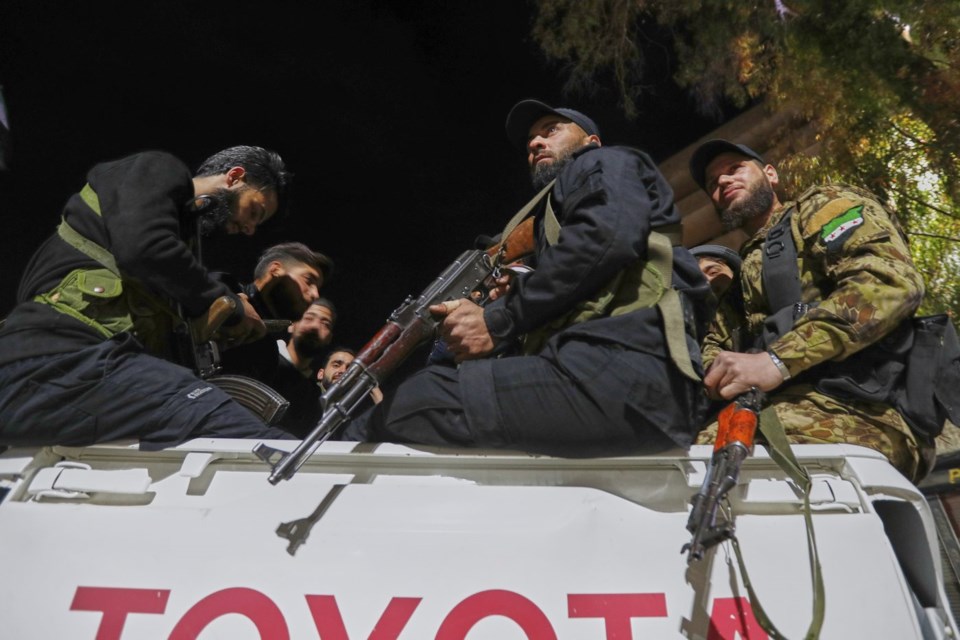DAMASCUS, Syria (AP) — Israel’s air force struck near Syria's presidential palace early Friday after warning Syrian authorities not to march toward villages inhabited by members of a minority sect in southern Syria.
The strike came after days of clashes between pro-Syrian government gunmen and fighters who belong to the Druze minority sect near the capital, Damascus. The clashes left dozens of people dead or wounded.
Syria's presidency condemned the Israeli airstrike, calling it a “dangerous escalation against state institutions and the soveignty of the state.” It called on the international community to stand by Syria, saying that such attacks “target Syria national security and the unity of the Syrian people.”
Friday's strike was Israel's second on Syria this week, and attacking an area close to the presidential palace appears to send a strong warning to Syria's new leadership that is mostly made up of Islamist groups led by Hayat Tahrir al-Sham.
On Thursday, Syria's Druze spiritual leader Sheikh Hikmat Al-Hijri harshly criticized Syria’s government for what he called an “unjustified genocidal attack” on the minority community.
Early Friday, the Druze religious leadership said that the community is part of Syria and refuses to break away from the country, adding that the role of the state should be activated in the southern province of Sweida and authorities should be in control of the Sweida-Damascus highway.
“We confirm our commitment to a country that includes all Syrians, a nation that is free of strife,” the statement said.
In the Damascus suburb of Jaramana, where fighting occurred earlier this week, security forces deployed inside the area along with local Druze gunmen, and at a later stage heavy weapons will be handed over to authorities. As part of the deal, forces from the defense ministry will deploy around Jaramana without going inside.
Israeli fighter jets strike near the palace
The Israeli army said that fighter jets struck adjacent to the area of the Palace of President Ahmad al-Sharaa in Damascus. Its statement gave no further details.
Israeli Prime Minister Benjamin Netanyahu and Defense Minister Israel Katz said that the strike was “a clear message” to Syrian leaders.
“We will not allow the deployment of forces south of Damascus or any threat to the Druze community," the joint statement said.
Pro-government Syrian media outlets said that the strike hit close to the People’s Palace on a hill overlooking the city.
Over the past two days, the Israeli military said that it had evacuated Syrian Druze who were wounded in the fighting.
The Israeli army said in a statement Friday that a soldier was killed and three were slightly injured in an accident in the Golan Heights. An army statement added that the soldiers were evacuated to receive medical treatment at a hospital and that the circumstances of the incident were being investigated.
Clashes set off by disputed audio clip
The clashes broke out around midnight Monday after an audio clip circulated on social media of a man criticizing Islam’s Prophet Muhammad. The audio was attributed to a Druze cleric. But cleric Marwan Kiwan said in a video posted on social media that he was not responsible for the audio, which angered many Sunni Muslims.
Syria’s Information Ministry said that 11 members of the country’s security forces were killed in two separate attacks, while Britain-based war monitor The Syrian Observatory for Human Rights said that 99 people — over the past four days of which 51 were killed in Sahnaya and the Druze-majority Damascus suburb of Jaramana — were killed in clashes, among them local gunmen and security forces.
The Druze religious sect is a minority group that began as a 10th-century offshoot of Ismailism, a branch of Shiite Islam. More than half of the roughly 1 million Druze worldwide live in Syria, largely in the southern Sweida province and some suburbs of Damascus.
Most of the other Druze live in Lebanon and Israel, including in the Golan Heights, which Israel captured from Syria in the 1967 Mideast War and annexed in 1981.
___ Mednick reported from Tel Aviv, Israel. Bassem Mroue contributed to this report from Beirut.
Ghaith Alsayed And Sam Mednick, The Associated Press



